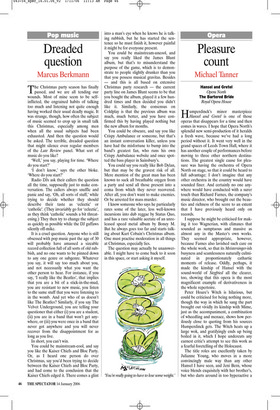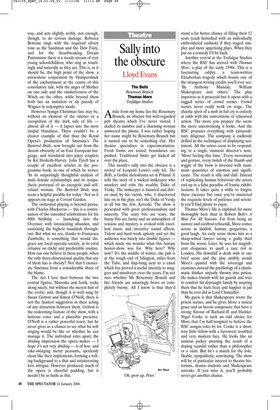Opera
Pleasure count
Michael Tanner
Hansel and Gretel Opera North The Bartered Bride Royal Opera House Humperdinck’s minor masterpiece Hansel and Gretel is one of those operas that disappears for a time and then comes in waves. I hope that Opera North’s splendid new semi-production of it heralds a fresh wave, because we’ve had a long period without it. It went very well in the grand spaces of Leeds Town Hall, where it has another couple of performances before moving to three other northern destinations. The greatest single cause for pleasure was having the orchestra of Opera North on stage, so that it could be heard to full advantage; I don’t imagine that any other orchestra in the country would have sounded finer. And certainly no one anywhere would have conducted with a surer touch than Richard Farnes, the company’s music director, who brought out the beauties and richness of the score to an extent that I have previously heard only on records.
I suppose he might be criticised for making it too Wagnerian, with climaxes that sounded as sumptuous and massive as almost any in the Master’s own works. They seemed appropriate, however, because Farnes also lavished such care on the whole work, so that its Meistersinger-ish busyness and seamlessness naturally culminated in proportionately cathartic moments of release. Oddly, perhaps, it made the kinship of Hansel with the sound-world of Siegfried all the clearer, too, showing that this opera is the most magnificent example of derivativeness in the whole repertoire.
Peter Hoare’s Witch is hilarious, but could be criticised for being nothing more, though the way in which he sang the part brought out vividly its kinship with Mime, just as the accompaniment, a combination of wheedling and menace, shows how perilously close to quoting from his sources Humperdinck gets. The Witch heats up a large wok, and gratifyingly ends up being boiled in it, which I hope undercuts any earnest critic’s attempt to see this work as a fearful foretelling of the Holocaust.
The title roles are excellently taken by Julianne Young, who moves in a more convincingly male way than any other Hansel I have seen, and Jeni Bern, whose voice blends exquisitely with her brother’s, but who darts around in too hyperactive a way, and acts slightly archly, not enough, though, to do serious damage. Rebecca Bottone sings with the required silvery tone as the Sandman and the Dew Fairy, and for the heartbreaking Dream Pantomime there is a steady stream of very young schoolchildren, who sing as touchingly and naturally as they act. This is, as it should be, the high point of the show, a miraculous conjuration by Humperdinck of the enchantment at the centre of this consolatory tale, with the anger of Mother on one side and the vindictiveness of the Witch on the other, while beyond them both lies an imitation or sly parody of Wagner in redemptive mode.
However benign Christmas fare may be, without an element of the sinister or a recognition of the dark side of life almost all of it — it lapses into the most insipid blandness. There couldn’t be a clearer example of that than the Royal Opera’s production of Smetana’s The Bartered Bride, now brought out from the decent obscurity of an East European language, and translated into jokey couplets by Kit Hesketh-Harvey. John Tyrell has a couple of excellent articles in the programme book, in one of which he writes: ‘In its surprisingly thoughtful analysis of male–female relationships and its sympathetic portrayal of an energetic and selfreliant woman, The Bartered Bride may seem a helpful parable for today.’ Not as it appears on stage at Covent Garden.
The orchestral playing is beyond praise, with Charles Mackerras — this is a continuation of the extended celebrations for his 80th birthday — launching into the Overture with intoxicating abandon, and sustaining the highest standards throughout. But what we see, thanks to Francesca Zambello, is something that would disgrace any local operatic society, in its total reliance on cliché and predictable routine. How can one believe in these people, when the only three-dimensional quality that any of them has is obesity? Not that I exonerate Smetana from a considerable share of the blame.
The Act I love duet between the two central figures, Marenka and Jenik, rocks along nicely, but without the merest hint of the erotic; and, though it is well sung by Susan Gritton and Simon O’Neill, there is not the faintest suggestion in their acting of any attraction between them. Gritton is the redeeming feature of the show, with a lustrous voice and a plausible presence. O’Neill is a rather powerful tenor, but he never gives us a chance to see what his soft singing would be like or whether he can manage it. The individual roles apart, the abiding impression the opera makes — I hope it’s not very abiding — is of hoeand rake-swinging merry peasants, spotlessly clean like their implements, forming a willing background to a thin and uninteresting love intrigue. However produced, much of the opera is cheerful padding, but it needn’t be as futile as this.















































 Previous page
Previous page